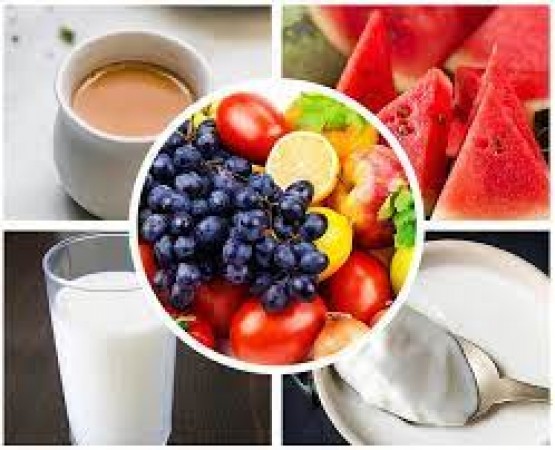
In the ever-evolving realm of gastronomy, our palate delights in the diverse symphony of flavors that the culinary world offers. However, in the pursuit of pleasure, we may unwittingly indulge in combinations that could potentially wreak havoc on our health. Let's embark on a gastronomic journey, unveiling the intricacies of food pairings that may pose unexpected dangers to our well-being.
The seemingly innocent alliance of citrus fruits and milk conceals a potential digestive dilemma. The acidity inherent in citrus fruits has the capacity to curdle the proteins present in milk, resulting in discomfort and indigestion. This clash of textures and acidity levels may take our digestive system by surprise.
The intricate dance of digestion becomes a tug-of-war when high-protein foods join forces with starchy carbohydrates. The body demands distinct enzymes for the breakdown of proteins and carbohydrates, and their simultaneous consumption can lead to a digestive conundrum, causing discomfort and distress.
While the idea of indulging in fruits post-meal radiates health consciousness, it may not align seamlessly with our digestive process. Fruits, rich in natural sugars, digest rapidly. When consumed immediately after a meal, they can ferment in the stomach, culminating in bloating and discomfort.
Indulging in a delightful dessert like apple pie can become a perilous venture, especially when coupled with a carb-heavy crust. This seemingly innocuous pairing can lead to a rapid spike in blood sugar levels, contributing to insulin resistance over time.
Yogurt, celebrated for its probiotic prowess, encounters a roadblock when paired with certain fruits. The natural sugars present in fruits can counteract the beneficial bacteria in yogurt, hindering its intended digestive advantages.
Tomatoes, despite their rich vitamin content, present challenges when combined with starchy carbs. The acidic nature of tomatoes can interfere with the starch digestion process, causing discomfort and disrupting the harmonious digestive symphony.
The allure of pasta primavera can be irresistible, but pairing tomato-based sauces with starchy pasta initiates a digestive double-whammy. Opting for lighter, non-tomato sauces can alleviate the digestive burden and enhance overall well-being.
The comforting ritual of a post-meal coffee may not be as comforting to our digestive system. Caffeine, a primary component of coffee, can hinder the absorption of iron, potentially leading to nutrient deficiencies over time.
The amalgamation of high-calcium foods with protein-rich sources introduces a potential clash in nutrient absorption. Separating the intake of these essential nutrients ensures optimal utilization by the body.
Melons, while refreshing on a hot day, are best enjoyed on an empty stomach. Consuming them after meals can lead to fermentation in the stomach, causing discomfort and disrupting the delicate digestive balance.
The classic combination of banana and milk, although popular, may not be as harmonious within our digestive system. Differing digestion times for these components can result in the production of toxins, leading to digestive distress.
The temptation of a cold drink during meals can have a chilling effect on digestion. Ice-cold water has the potential to solidify fats from the meal, making them challenging to digest efficiently.
As we navigate this labyrinth of culinary intricacies, mindfulness becomes our compass. Opting for well-balanced meals, considering digestion times, and understanding the intricacies of nutrient absorption contribute to a healthier gastronomic journey. Knowledge is the key to a well-nourished and happy body. Choose your food combinations wisely, and let your culinary adventures be a celebration of good health!
Gujarat: Lightning Claims 20 Deaths Amid Unseasonal Rainfall
Uttarkashi Tunnel Work In Progress, 'Perpendicular Drilling' SetsTo Begin Today
India's largest Tiger reserve to be set up at Damoh, Madhya Pradesh